Jennifer Casolo, Inge Hutter, Sunita Narain, Bukola Oyinloye
Moderator: Danny Cassimon
2022 HDCA Annual Members Meeting
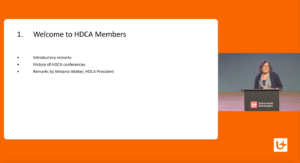

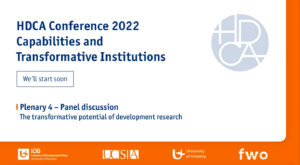
Jennifer Casolo, Inge Hutter, Sunita Narain, Bukola Oyinloye
Moderator: Danny Cassimon
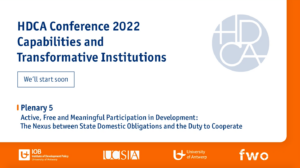
Speaker: Bonny Ibhawoh, Centre for Peace Studies, McMaster University
Discussant: Priscilla Claeys, Centre for Agroecology, Water and Resilience, Coventry University
Moderator: Koen De Feyter
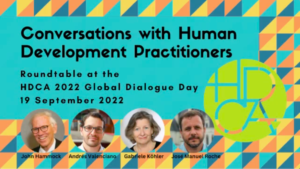
Practitioners Roundtable at the HDCA 2022 Global Dialogue Day
Organized by the Early Career Researchers and Practitioners Network (ECRPN)
Practitioners fulfill a crucial role in bringing about the opportunities people value and in realizing human development in diverse localized contexts. In this panel, four practitioners from government, NGOs and the UN discuss how they engage with and apply a human development framework in their work to bridge the divide between research and practice. The panelists offer experiences drawn from their practice and share insights on key questions.
HDCA Webinar 2022 Early Career Researchers and Practitioners Network HDCA Videos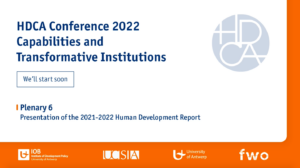
Heriberto Tapia, Krushil Watene, Giulia Greco, Marc Fleurbaey
Moderator: Katrien Schaubroeck
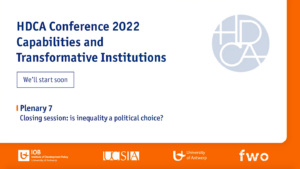
Lucas Chancel, Murray Leibbrandt, Supriya Garikipati, Bea Cantillon
Moderator: Tom De Herdt
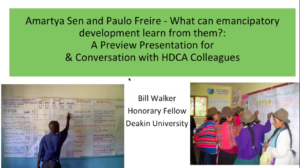
Talk by Dr. Bill Walker
Hosted by the HDCA Asia-Pacific Regional Network (APRN)
Amartya Sen and Paulo Freire are two of the most influential development thinkers of the last fifty years. While both emphasized that development requires freedom and justice, their writings emerged in markedly different contexts, their assumptions often differed, they reached distinctively different conclusions, and their work spawned separate movements. The presented paper aims to compare their thinking and explore potential synergies between them and their movements, which are germane to contemporary development.
HDCA Webinar 2022 Asia-Pacific Region Network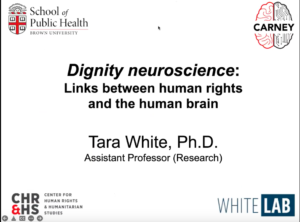
Presented by Dr. Tara White, Assistant Professor of Behavioral and Social Sciences (Research) and the founding director of the Laboratory of Affective Neuroscience at Brown University
Neuroscientist and psychology researcher Tara White proposes that protections provided by international human rights instruments are rooted in fundamental properties of the human brain. The emerging field that she has named dignity neuroscience stems from her and others’ work in human brain science and human emotions. Dr. White proposes a framework that provides an empirical foundation to support and foster human dignity, universal rights, and their active furtherance by individuals, nations, and international law. It incorporates understandings of brain structures involved in agency, autonomy, and self-determination, the harms of privation and maltreatment, and the concept of intrinsic human dignity expressed in longstanding cultural, religious, and philosophical traditions.
HDCA Webinar 2022 Human Rights HDCA Videos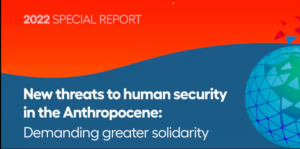
A webinar on the 2022 UNDP-HDRO Special Report on Human Security
Report leader, Dr. Heriberto Tapia, plus members of the Report team, present an overview of the Report’s purposes, main arguments, and hoped-for uses. Presenters: Andrew Crabtree, Copenhagen Business School
Oscar A. Gómez, Ritsumeikan Asia Pacific University
John Morrissey, National University of Ireland
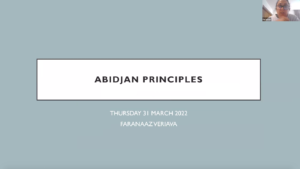
A conversation with Dr. Faranaaz Veriava
Adopted in 2019, the Abidjan Principles lay out governments’ international legal obligations in the area of education to ensure education rights do not get undermined by private actors. Dr. Faranaaz Veriava, who served on the advisory committee to the drafting team, describes how the principles have been used by education advocates in litigation and advocacy. Enough time will be put aside to ensure participants have the chance to ask questions and to engage with each other.
HDCA Webinar 2022 Education Human Rights HDCA Videos